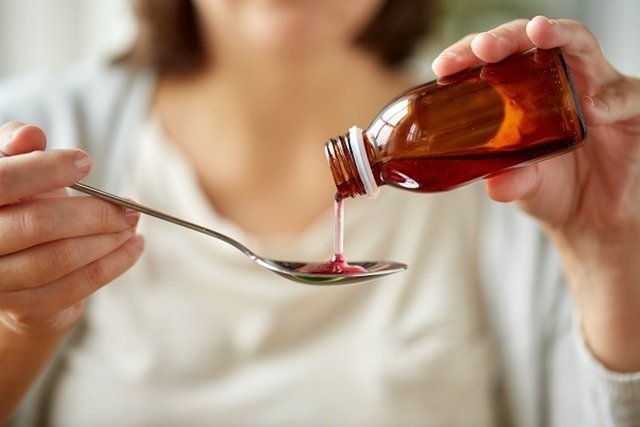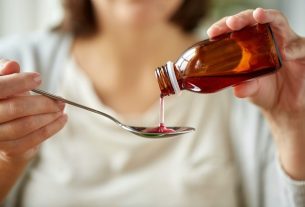Cough syrups for phlegm, such as ambroxol, guaifenesin or bromhexine, have an expectorant or mucolytic action that helps to make the phlegm more liquid and looser, facilitating its elimination through the respiratory tract.
A cough with phlegm can be caused by flu, colds, bronchitis, allergic rhinitis, pneumonia or sinusitis, and be accompanied by symptoms such as fever, tiredness, shortness of breath or headache, for example.
Cough syrups with phlegm should only be taken with a doctor’s advice after identifying the cause of the cough and evaluating whether it is also necessary to take other medications. Babies and children should only take medication under the guidance of their pediatrician.
Main syrups for coughing with phlegm
The main cough syrups for phlegm are:
1. Ambroxol
Ambroxol syrup is an expectorant that can be used to treat bronchitis, especially chronic bronchitis, as it helps to make phlegm less thick, which makes it easier to eliminate.
In addition, they can also have an antitussive action that helps relieve coughing with phlegm, being found as a generic or under the names Mucossolvan, Bronxol, Sedavan or Ambroxmel, for example.
Ambroxol syrup can be found in different concentrations, being 6 mg/mL for adults and 3 mg/mL for children.
How to use: the recommended dose of adult ambroxol syrup of 6 mg/mL (or 30 mg/5mL) is 5 mL of syrup, 3 times a day. For children over 2 years old, doses must be advised by the pediatrician. Find out how to give ambroxol syrup to children.
2. Bromexin
Bromhexine is a phlegm cough syrup that helps dissolve phlegm and activate the bronchial cilia, facilitating the movement of phlegm, allowing it to be eliminated more easily.
This syrup is indicated for acute and chronic bronchopulmonary diseases, and is available in the form of a 0.8 mg/mL pediatric syrup or a 1.6 mg/mL adult syrup.
Bromhexine syrup must be used under medical advice and can be purchased as a generic or under the names Bisolvon or Pulmed, for example.
How to use: the dose of adult syrup of 1.6 mg/mL (or 8 mg/5mL) normally indicated for adults and adolescents over 12 years of age is 5 mL, 3 times a day, or as prescribed by a doctor. See also how to use children’s bromhexine syrup.
3. Acetylcysteine
Acetylcysteine phlegm cough syrup has a mucolytic action that acts by fluidifying the secretions produced in the lungs, facilitating their elimination from the airways.
This syrup can be used by adults or children over 2 years of age in cases of acute or chronic bronchitis, pneumonia, pulmonary emphysema, cystic fibrosis or chronic obstructive pulmonary disease (COPD), for example.
Acetylcysteine syrup has two different concentrations, 40 mg/mL for adults and 20 mg/mL for children.
How to use: The dose for adults varies according to the condition being treated, and is generally 600 mg per day, which corresponds to 15 mL of the 40 mg/mL adult syrup, once a day, preferably at night. Learn how to take acetylcysteine correctly.
4. Guaifenesina
Guaifenesin is an expectorant that acts to make phlegm less thick, which facilitates its elimination, and is recommended for the treatment of flu and colds. Check out other flu syrups.
This syrup is available in concentrations of 200 mg/15mL, 200 mg/12.5 mL or 100 mg/15mL, suitable for adults and children over 2 years old.
Guaifenesin syrup can be purchased as a generic or under the trade names Vick Syrup, Transpulmin, Cimetosse or Expectovic, for example:
How to use: the dose of guaifenesin syrup 200 mg/15mL for adults or children over 12 years of age is 15 mL (200 mg), every 4 hours. See guaifenesin doses for children and other ways to use it.
5. Dextrometorfano
Dextromethorphan syrup, associated with guaifenesin, is an expectorant and antitussive that helps eliminate phlegm and relieve coughs.
This syrup is found under the name Vick 44E and can be used by adults or children over 6 years old.
How to use: The recommended dose for adults and children over 12 years of age and weighing more than 43 kg is 15 mL of syrup, every 4 to 6 hours, up to a maximum of 6 doses per day. Learn how to take Vick 44 E syrup correctly.
6. Carbocisteína
Carbocisteine is a phlegm cough syrup indicated for chronic bronchitis, cystic fibrosis, pulmonary emphysema or other obstructive airway diseases, as it has a mucolytic action that fluidifies the phlegm, facilitating its elimination.
This syrup can be found in its generic form or under the names Mucofan or Mucotoss, in concentrations of 250 mg/5 mL for adults and 100 mg/5 mL for children over 2 years old.
How to use: The dose of 250 mg/5 mL syrup for adults is 5 mL to 10 mL, 3 times a day, or as directed by your doctor. For children over 2 years old, the dose of 100 mg/5 mL children’s syrup is 0.25 mL per kg of body weight, 3 times a day, and should be used under the guidance of a pediatrician. See how to take carbocisteine.
7. Acebrofilin
Acebrophylline phlegm cough syrup is indicated for the treatment or prevention of diseases of the respiratory system, which cause bronchospasm and increased phlegm production, such as bronchitis, bronchial asthma or rhinopharyngitis, for example.
This medicine has an expectorant and mucolytic action that helps make phlegm more liquid and easier to eliminate, in addition to having a bronchodilator effect, making breathing easier.
Acebrophylline syrup can be found in two presentations: 50mg/5mL for adults and 25mg/5mL for children over 2 years old, as a generic or under the trade names Brondilat or Filinar.
How to use: the dose of 50 mg/5mL syrup for adults is 10 mL (1 measuring cup) every 12 hours, or as directed by a doctor. See how to give pediatric acebrophylline syrup.
8. Epsilon aminocaproic acid
Epsilon aminocaproic acid syrup, sodium benzoate, guaifenesin, ammonium chloride, acts to fluidify phlegm and increase expectoration, indicated for inflammation of the respiratory tract.
Furthermore, this syrup can be used together with other medicines in cases of asthmatic attacks.
This syrup is called Eaca Balsamic and can be used by adults or children over 2 years old, according to medical advice.
How to use: the dose for adults is 10 mL of syrup, every 4 hours, or as directed by a doctor. For children aged 2 to 10 years, the normally recommended dose is 5 mL of syrup every 4 hours.
9. Ivy helix
The syrup Ivy helix L. made with the dry extract of the leaves of this medicinal plant, it is a herbal syrup indicated for coughs with phlegm, as it has an expectorant and phlegm-fluidifying action.
This syrup can be found in a concentration of 15 mg/mL under the name Benetosse, or 7 mg/mL under the names Respiratus, Abrilar or Phitóss, for example, and must be used under medical advice.
How to use: the dose for adults or children over 12 years of age is 3 mL of Benetosse 15mg/mL syrup, twice a day.
For children, the 7 mg/mL syrup (Respiratus, Abrilar or Phitóss) should preferably be used, with the normally recommended dose for children aged 2 to 5 years being 2.5 mL, twice a day, and for children aged 6 to 12 years, 2.5 mL, 3 times a day, or as directed by the pediatrician. See how to take the syrup Ivy helix correctly.
10. Eucalyptus gum
The syrup Eucalyptus gum is a tincture prepared with the leaves of this medicinal plant, and is recommended as an expectorant and antitussive, to relieve coughs caused by colds or flu.
This herbal syrup for coughing with phlegm is available under the name Bronquivita and should be used under medical advice, mainly because it contains alcohol in its composition.
How to use: the dose for adults is 15 mL of syrup (1 and ½ measuring cup), every 3 hours, or as per medical advice.
11. Guaco
Guaco is a herbal syrup for coughing with phlegm prepared from the leaves of the medicinal plant Micania glomerata Spreng, indicated as an expectorant as it facilitates the elimination of phlegm.
Furthermore, this syrup has a bronchodilator effect, promoting relaxation of the bronchial muscles, facilitating breathing and helping to combat coughing.
Guaco syrup is found in different presentations, 0.5 mL/5 mL from the Herbarium laboratory containing 1% alcohol in its composition, or 35 mg/mL and 117.6 mg/mL from the Natulab laboratory.
How to use: the dose of Herbarium guaco syrup 0.5 mg/mL for adults is 5 mL of syrup, up to 3 times a day.
The recommended dose for adults of Natulab guaco syrup 35 mg/mL is 15 mL, up to 3 times a day. See how to use guaco syrup correctly.
12. Micania glomerata
The herbal syrup of Micania glomerata, associated with watercress, polygala, ipecac and aconite, is indicated for the treatment of flu or allergic bronchitis, helping to relieve coughs with phlegm or dry coughs. See other dry cough syrups.
This syrup is found under the name Melagrião, and can be used by adults or children over 2 years old, with medical advice.
How to use: the dose of Melagrião syrup for adults is 15 mL, every 3 hours. See the doses of Melagrião for children.
Cough syrup for children’s phlegm
Cough syrups for children’s phlegm, such as ambroxol, bromhexine or acetylcysteine, may be recommended by the pediatrician for children over 2 years of age, after evaluating the cause of the cough.
Generally, these syrups are less concentrated than those for adults and can be identified on the packaging with the words “child use”, “pediatric use” or “children”.
It is important to emphasize that pediatric cough syrups for phlegm should only be used under the advice of a pediatrician. See the complete list of children’s expectorant syrups.
When to go to the doctor
You should consult a pulmonologist, otorhinolaryngologist or general practitioner in the following situations:
- Lots of phlegm or bloody phlegm;
- Cough that causes nausea or vomiting;
- Breathing faster than normal or difficulty breathing;
- Wheezing when breathing;
- Fever.
In the case of babies and children, it is always important to take them to the pediatrician so that the cause of the cough with phlegm can be identified and the most appropriate treatment can be indicated. See the main causes of coughing in babies.

Sign up for our newsletter and stay up to date with exclusive news
that can transform your routine!
Warning: Undefined array key "title" in /home/storelat/public_html/wp-content/plugins/link-whisper-premium/templates/frontend/related-posts.php on line 12
Warning: Undefined array key "title_tag" in /home/storelat/public_html/wp-content/plugins/link-whisper-premium/templates/frontend/related-posts.php on line 13




